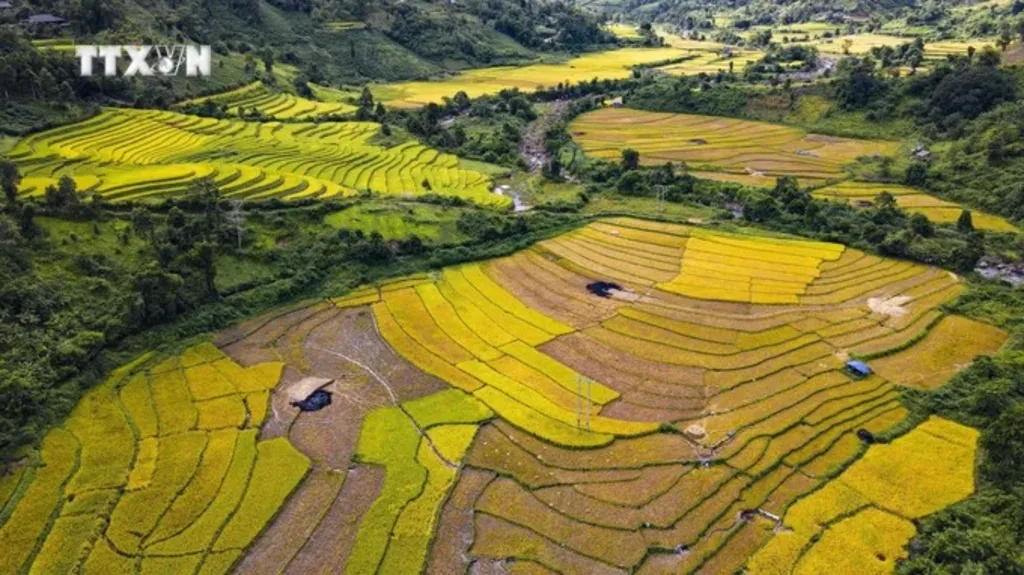 |
| Golden-ripened rice season in Dien Bien province, Muong Nhe district __Photo: VNA |
Muong Nhe, a border district in the northwest province of Dien Bien, is a land of breathtaking natural beauty and vibrant ethnic diversity. With its unique cultural heritage and stunning landscapes, the district holds immense potential for tourism centered on exploration and cultural discovery.
When people think of Muong Nhe, the A Pa Chai marker often comes to mind. Situated on Khoan La San Mountain in Sin Thau commune, this border marker denotes the meeting point of Vietnam, Laos, and China. Standing at an elevation of 1,864 meters above sea level, the marker was completed on June 27, 2005. It is a two-meter-tall stone monument with three sides, each engraved with the national emblem and inscriptions in the language of one of the three countries. Locals often joke that this is where a rooster’s crow can be heard in all three nations.
As Vietnam’s westernmost point, A Pa Chai is a magnet for adventurers and nature lovers. In the past, reaching the marker require 3–4 hours of trekking through dense forests and streams. However, since 2018, a paved concrete path with steps has made the journey more accessible to visitors.
Nguyen Van Anh, a tourist from Hanoi, shared his experience of visiting Vietnam’s notable landmarks, including the northernmost point in Ha Giang and the southernmost point in Ca Mau. However, standing at the A Pa Chai marker, holding the Vietnamese flag, gave him a sense of pride and emotion. He said that conquering such milestones deepened his love for Vietnam.
Tourism highlights in Muong Nhe
Beyond the journey to the A Pa Chải marker, visitors can immerse themselves in the vibrant atmosphere of the A Pa Chai border market in Sin Thau commune. Open on the 3rd, 13th, and 23rd of each month, the market is a lively hub where tourists can shop, interact with locals, and engage with neighboring communities.
Additionally, the A Pa Chai–Long Phu border crossing is slated for an upgrade to an official border gate under a bilateral agreement between Vietnam and China. Muong Nhe boasts an array of attractions, including the Muong Nhe Nature Reserve, Quang Lam hot springs, and the cloud-hunting spot in Chuyen Gia 2 Hamlet. The district's terraced fields, particularly in Huoi Thanh hamlet, Nam Ke commune, resemble stunning natural paintings during the rice harvest season. For adventure enthusiasts, Muong Nhe’s rugged mountain ranges and towering peaks provide ideal opportunities for trekking and mountain climbing.
Home to ten ethnic groups, Muong Nhe is a vibrant tapestry of cultures. It is the only district in Dien Bien province where the Ha Nhi and Si La ethnic groups reside. Visitors can witness their distinctive traditional attire, rituals, and dances while sampling authentic ethnic cuisine.
The district also preserves eight ethnic festivals and three nationally recognized intangible cultural heritages, namely the Cong ethnic minority’s Cockscomb Flower Tet Festival, the Ha Nhi ethnic group’s Ga Ma Thu worship ritual, and their traditional garment-making techniques.
Additionally, the Thai Xoe dance has been honored by UNESCO as an Intangible Cultural Heritage of Humanity. The People's Committee of Muong Nhe district is working with provincial authorities to establish a comprehensive tourism network. Their aim is to connect key landmarks, including the border junction between Vietnam, Laos and China, A Pa Chai border gate, the sovereignty flagpole, and the Ta Mieu spiritual site.
The district has also outlined a tourism development strategy aligned with cultural preservation for the 2021–2025 period, with a vision toward 2030.
Bui Minh Hai, Secretary of the district Party Committee, emphasized that since 2021, Muong Nhe has actively participated in regional tourism linkage programs to promote tourism of the district and Dien Bien province to both domestic and international audiences.- (VNA/VLLF)









